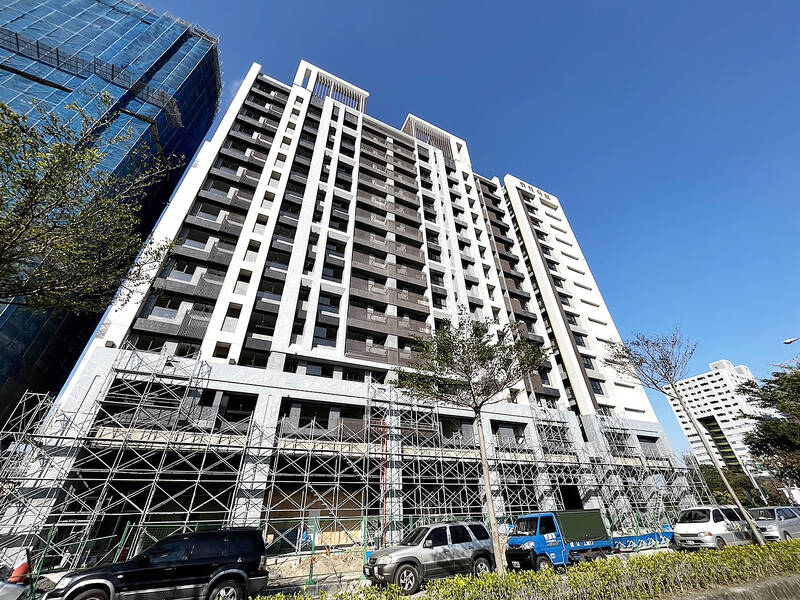New Taipei City-based property developer Pau Jar Group (寶佳機構) last year launched the most new projects nationally, as it capitalized on improved infrastructure to expand its business, a survey by the online realty arm of Addcn Technology Co (數字科技) showed.
The developer released 76 projects featuring more than 16,000 apartment units near high-speed train stations in Hsinchu, Taichung and Kaohsiung, as well as in second-tier locations, newhouse.591.com (591新建案) data showed.
The projects could attract NT$212.9 billion (US$7.01 billion) in revenue and have made the company visible in nearly all major markets across Taiwan, the online broker said.

Photo: Hsu Yi-ping, Taipei Times
While building on higher-value land near transportation hubs, Pau Jar did not abandon its focus on second-tier areas, the developer’s strongholds, to meet demand from buyers who cannot afford housing in popular locations, it said.
The strategy helped Pau Jar claim 10 percent of all new housing projects, it said.
High Wealth Construction Co (興富發) ranked second with seven projects expected to generate NT$70.2 billion in sales, the survey showed.
Maw Der Property Development Co (茂德機構) placed third with NT$65.3 billion in new projects that offer more than 3,000 apartment units, the online broker said, adding that most are in New Taipei City’s Sanchong (三重) and Wugu (五股) districts.
Presale house projects last year approached NT$2 trillion, and the top 10 players drove NT$600 billion, suggesting that they remained positive despite a slowdown in sales in the second half of last year, newhouse.591.com said.
The Fong-Yi Group (豐邑機構), a lesser known name focused mainly on on the Hsinchu and Taichung markets, placed fourth with NT$59.6 billion in presale projects, the survey showed.
Well-established brands I Sunny Co (愛山林建設), Huaku Development Co (華固建設) and Cathay Real Estate Development Co (國泰建設) remained major players, while Fu Yu Construction Co (富宇建設機構), Yun Hsin Construction Co (永信建設) and Hui Yu Architecture Co (惠宇建設) rounded out the top 10 list as property development increased in central and southern Taiwan during the past few years, newhouse.591.com said.
Developers plan to introduce more presale projects this year to land stock, although it is unknown how buyers might react to a ban on transfers of presale house purchase agreements, the online broker said.
The ban was passed by the legislature earlier this month, and the Ministry of the Interior is determining when the legislation should take effect.

Nissan Motor Co has agreed to sell its global headquarters in Yokohama for ¥97 billion (US$630 million) to a group sponsored by Taiwanese autoparts maker Minth Group (敏實集團), as the struggling automaker seeks to shore up its financial position. The acquisition is led by a special purchase company managed by KJR Management Ltd, a Japanese real-estate unit of private equity giant KKR & Co, people familiar with the matter said. KJR said it would act as asset manager together with Mizuho Real Estate Management Co. Nissan is undergoing a broad cost-cutting campaign by eliminating jobs and shuttering plants as it grapples

PERSISTENT RUMORS: Nvidia’s CEO said the firm is not in talks to sell AI chips to China, but he would welcome a change in US policy barring the activity Nvidia Corp CEO Jensen Huang (黃仁勳) said his company is not in discussions to sell its Blackwell artificial intelligence (AI) chips to Chinese firms, waving off speculation it is trying to engineer a return to the world’s largest semiconductor market. Huang, who arrived in Taiwan yesterday ahead of meetings with longtime partner Taiwan Semiconductor Manufacturing Co (TSMC, 台積電), took the opportunity to clarify recent comments about the US-China AI race. The Nvidia head caused a stir in an interview this week with the Financial Times, in which he was quoted as saying “China will win” the AI race. Huang yesterday said

TEMPORARY TRUCE: China has made concessions to ease rare earth trade controls, among others, while Washington holds fire on a 100% tariff on all Chinese goods China is effectively suspending implementation of additional export controls on rare earth metals and terminating investigations targeting US companies in the semiconductor supply chain, the White House announced. The White House on Saturday issued a fact sheet outlining some details of the trade pact agreed to earlier in the week by US President Donald Trump and Chinese President Xi Jinping (習近平) that aimed to ease tensions between the world’s two largest economies. Under the deal, China is to issue general licenses valid for exports of rare earths, gallium, germanium, antimony and graphite “for the benefit of US end users and their suppliers

Dutch chipmaker Nexperia BV’s China unit yesterday said that it had established sufficient inventories of finished goods and works-in-progress, and that its supply chain remained secure and stable after its parent halted wafer supplies. The Dutch company suspended supplies of wafers to its Chinese assembly plant a week ago, calling it “a direct consequence of the local management’s recent failure to comply with the agreed contractual payment terms,” Reuters reported on Friday last week. Its China unit called Nexperia’s suspension “unilateral” and “extremely irresponsible,” adding that the Dutch parent’s claim about contractual payment was “misleading and highly deceptive,” according to a statement